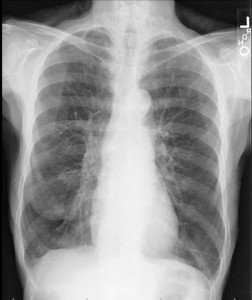Study suggests frequent exacerbations do not contribute to permanent worsening of COPD in former smokers
Do acute exacerbations cause permanent worsening of chronic obstructive pulmonary disease (COPD)? A recent study suggests frequent moderate exacerbations (worsening of acute symptoms) do not contribute to progressive decline of pulmonary function among former smokers.
 Employers and insurers of workers’ compensation are typically deemed responsible for worsening of pre-existing conditions due to injurious workplace exposures under an occupational disease theory of liability.[1] Workers with COPD, chronic bronchitis and emphysema, are purportedly susceptible to acute exacerbations of their pulmonary conditions when exposed to organic compounds, dust and fumes during employment.
Employers and insurers of workers’ compensation are typically deemed responsible for worsening of pre-existing conditions due to injurious workplace exposures under an occupational disease theory of liability.[1] Workers with COPD, chronic bronchitis and emphysema, are purportedly susceptible to acute exacerbations of their pulmonary conditions when exposed to organic compounds, dust and fumes during employment.
COPD is a group of progressive lung disorders, including asthma, bronchiectasis, chronic bronchitis and emphysema.[2] The third leading cause of death worldwide behind ischemic heart attack and stroke,[3],[4] COPD accounts for approximately 134,000 American lives each year.[5] Smoking tobacco products[6] and acute exacerbations[7] are typically considered contributing factors to the progression of COPD.[8] A medical research investigation, however, challenges the prevailing theory that frequent moderate acute exacerbations permanently worsen COPD.
The International Journal of Chronic Obstructive Pulmonary Disease published a two-year cohort study of 100 former smokers.[9] Clinical evaluations included standard diagnostic pulmonary tests, such as anthropometry, spirometry, inspiratory capacity, peripheral capillary oxygen saturation and severity of dyspnea. Among COPD patients who were former but not active smokers, the results reveal no significant difference in the progression of clinical and functional decline.
The study may not dispute the relationship between workplace exposures and exacerbations of pulmonary conditions. Nonetheless, the research does reveal medical evidence to question whether occupational exacerbations of pre-existing COPD cause requisite worsening for entitlement to time loss compensation or permanent partial disability awards.
[1] Washington: See, e.g., RCW 51.08.100 “’Occupational Disease’ means such disease or infection as arises naturally and proximately out of employment . . ..”; Dennis v. DLI, 109 Wn.2d 467, 745 P.2d 1295 (1987); In re: Forrest Pate, BIIA Dec 58,399 (1982) (Insurer on the risk for occupational disease – lung condition – on the date of compensable disability is responsible for the full costs of the claim if the exposure on that date was “of a kind” contributing to the condition for which the claim was made.); In re: Harry Lawrence, Dec’d, BIIA Dec. 54,394 (1980) (Lung Condition). Oregon: See, e.g., ORS 656.226 “Burden of proving compensability and nature and extent of disability”; ORS 656.005(7)(a) “A ‘compensable injury’ is an accidental injury . . .; an injury is accidental . . . if it is established by medical evidence supported by objective findings . . ..”; Norpac Foods, Inc. v. Gilmore, 318 Or 363, 366 (1994); Rogers v. SAIF, 289 Or 633 (1980).
[2] McGraw-Hill Concise Dictionary of Modern Medicine. © 2002 by The McGraw-Hill Companies, Inc.; Mosby’s Medical Dictionary, 8th edition. © 2009, Elsevier.
[3] Chronic Obstructive Pulmonary Disease (COPD) Fact Sheet, American Lung Association.
[4] World Health Organization.
[5] Approximately 70,000 Females and 64,000 Males died as a result of COPD in 2010; Centers for Disease Control and Prevention. National Center for Health Statistics. National Vital Statistics Report. Deaths: Final Data for 2010. May 2013; 61(04).
[6] U.S. Department of Health and Human Services. The Health Consequences of Smoking—50 Years of Progress: A Report of the Surgeon General, 2014.
[7] Exacerbations of COPD are defined as sustained worsening of the patient’s symptoms from his or her usual stable state, which is beyond normal day-to-day variations and is acute in onset. Chronic obstructive pulmonary disease: Management of chronic obstructive pulmonary disease in adults in primary and secondary care (partial update), National Institute for Health and Care Excellence (NICE); Melinda Ratini, DO, Reviewer, 10 Signs of a COPD Exacerbation, December 29, 2014.
[8] Madeline Vann, MPH, Cynthia Haines, MD, When COPD Symptoms Worsen, Everyday Health, December 27, 2012.
[9] Dreyse, J., et al., Do frequent moderate exacerbations contribute to progression of chronic obstructive pulmonary disease in patients who are ex-smokers?, Int J Chron Obstruct Pulmon Dis. 2015 Mar 10;10:525-33.
